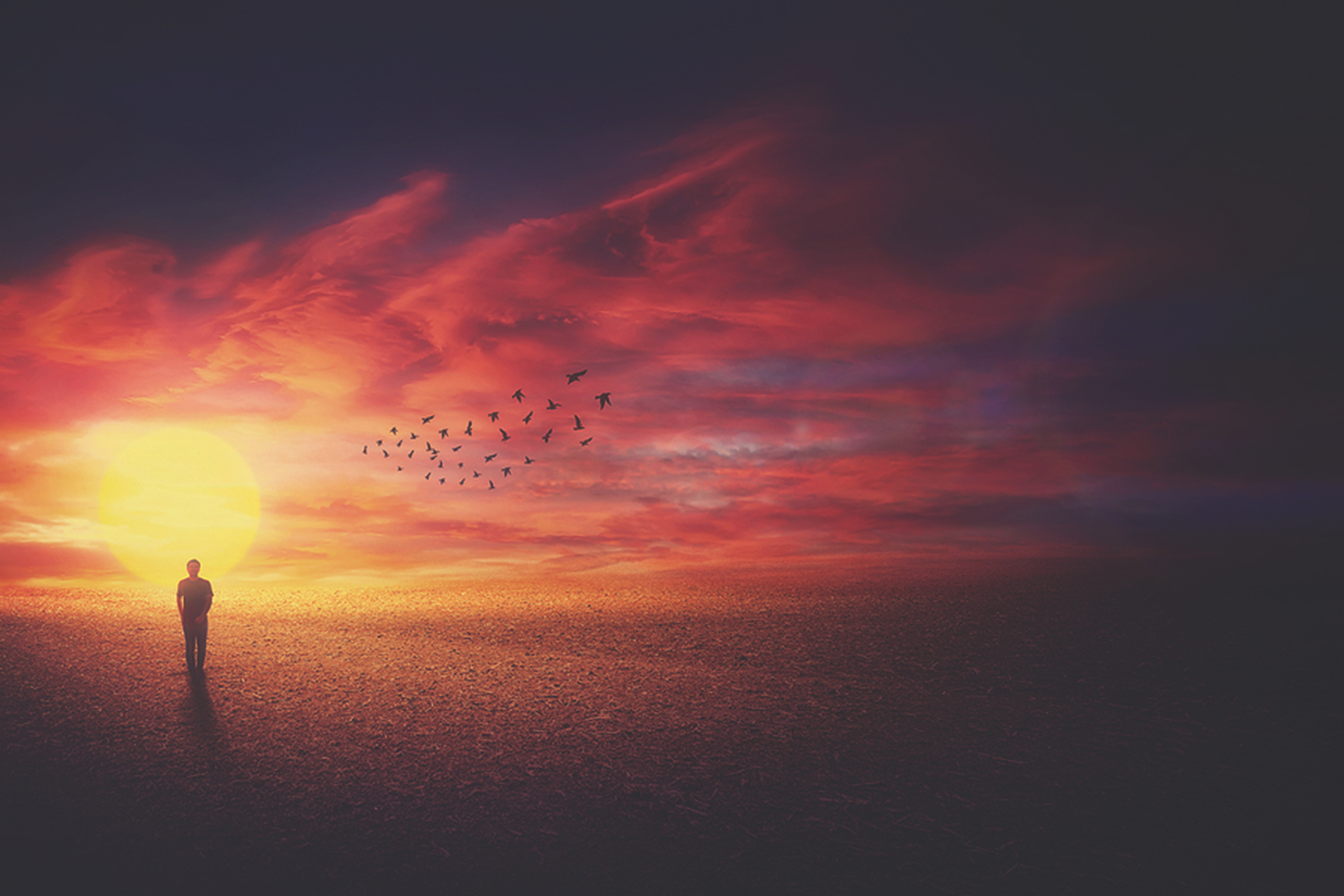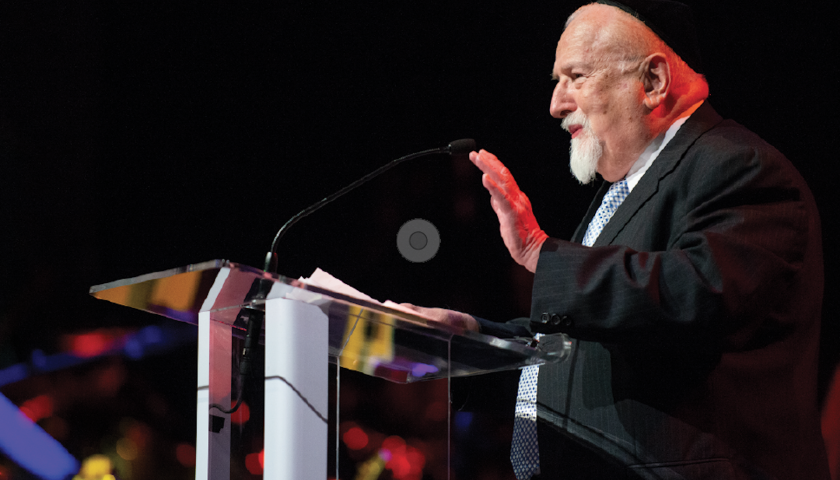The message of uncertainty, and liberation from predictability.
By: Rabbi Dovid Samuels
One of the ideas given as to why we are commanded to dwell in sukkahs after the Yomim Nora’im is that just in case it was decided on Rosh Hashanah that we, chas veshalom, deserved to be sent into galus – exile, our living outside in the sukkah should be a (more pleasant) fulfilment of that harsh decree, and will hopefully exempt us from the “real thing”.
The question is an obvious one: how could the experience of living in our sukkahs for seven days possibly compare (and compensate) for actual galus? One need not look far back in Jewish history to see what sufferings galus has brought upon our special nation. Our decadent and luxurious sukkahs are certainly no galus. So how can our sukkahs be a substitute for actual exile? To understand this idea, we have to understand what the primary message of galus is, and we will realise that the mitzvah of sukkah is not so far removed.
At a glance, one might be led to believe that the story of the Jews in exile is a story of Divine punishment. We sinned, and because of that our Temple was destroyed, communities were scattered, family life was disrupted, and there has been much bloodshed. But when we understand that we are children of Hashem, that He is our father, and that even though mistakes were made, some very grave mistakes, He has never and will never abandon us. His primary goal is for each and every one of us to reach perfection and to be able to experience the sublime thrill and pleasure of being spiritually close to Him. Galus, therefore, is not purely a punishment; rather it is a change of arena, where we are able to work on certain aspects of our relationship with Hashem so that we will be more deserving and capable of experiencing the benefits that come with such a relationship. Galus is our rehabilitation. So what is the lesson that we need to learn? What is the lesson that galus teaches us?
The gloomy backdrop of galus is a curtain of uncertainty. We like to imagine that our lives are set-out and predictable, but galus (and the study of our history in galus) is a stark reminder that nothing is certain. How long will Jews be allowed to live in England? How long will Jews have religious freedom in Spain? How long will Jews be able to earn a livelihood in Russia? How long will Jewish life in Germany last? The answers to these questions surely surprised and shocked those who were asking them, but are the answers really shocking? Afterall, we are in galus; nothing is certain. But with all the uncertainty that the last 2000 years of Jewish life has endured, if we look deeply, there is one certainty: Hashem is our father, and He has a purpose for us. This means that He is interested and involved in our lives. This means that we have supreme spiritual potential and that our actions matter and the events in our lives are there to shape and refine us spiritually. And it means that as transient as life in this world may be, our soul is attached to Eternity and will survive everything. Galus, therefore, is a bootcamp where we learn the lesson that every step we take is totally dependent on Hashem, and we can only truly rely on Him.
The words “we need the geula – redemption” often fall off the lips of those who long for the fulfilment of Hashem’s plan for His people. A worthwhile thought for sure, particularly when we feel the hardship of galus. But we also have to realise that while we are still in galus and as much as we want and pray for the geula, what we are really striving for is not to escape galus, but rather to finally learn the lessons of galus.
Galus encourages us to fulfil the verse in Hallel: “Better to trust in Hashem than in man; better to trust in Hashem than generous ones.” We learn, through personal and communal experiences that our only hope is to cast ourselves under the shade of Hashem’s providence. It goes without saying that we certainly need to make certain efforts (hishtadlus) in our lives, but the success of all of our efforts is decided by Hashem. We are not in control, and, truthfully, we wouldn’t want to be. Once, the Rebbe of Ropschitz was once asked how he would run the world if he was Hashem. He replied: “I would do everything exactly the same, because everything Hashem does is for the good.” To demand control of our lives would require total knowledge of everything, including what’s ultimately best for us. Only One knows that.
As we turn our attention to the mitzvah of Sukkah, we are told to dwell in the sukkah for seven days. Now, in truth, although one can spend hours and hours in the sukkah each day, usually the time spent outside the sukkah is much more than the time spent inside. There are many situations when a person is not even obligated to sit in the sukkah, for example during heavy rainfall and extreme heat. So how can the verse tell us to live in the sukkah for seven days when we might only rack up much less than that? The answer is that during the festival of Sukkos, in as much as we are obligated to actually sit and ‘live’ in the sukkah, there is an added aspect of ‘living’ in the concept of the sukkah. There is a lesson that we learn from the sukkah that should permeate our lives for seven days, even when the rain might have forced us inside.
Although our personal experiences in the sukkah might be idyllic, the reality of the sukkah is that there is very little certainty. Our sukkahs may be strong, but the basic sukkah requirement is actually rather flimsy. Imagine for a moment being on the top of a building in Jerusalem, with winds so strong that the s’chach literally blows off one sukkah and lands on the roof of the building across the streets. Imagine having to rebuild the walls the next morning after a midnight collapse. Imagine falling asleep in the sukkah when suddenly the next-door neighbour decides to turn his music up, keeping you awake. There’s nothing like waking up at 2am to the feeling of raindrops hitting you on the face and having to schlep mattresses inside! While this might not be the reality of Sukkos for all of us, this is certainly the concept of the sukkah. But how do we respond to these inconveniences; or should we perhaps call it: this lack of control?
Chazal refer to the sukkah as the shade of Emunah – faith. ‘Living’ in the sukkah is living with the knowledge that Hashem loves you, and He is in control. This doesn’t mean that everything will happen the way we want it to. What it means is that everything that happens is beneficial for us; everything that happens to us is another opportunity to galvanise the relationship between us and Hashem; between us and perfection and, ultimately, true happiness. Hashem gave us this tool as a way of establishing a relationship with us after taking us out of Egypt. Egypt was a place where life happened, but we couldn’t relate to Hashem through our experiences. We were trapped in a world of nature, a world of randomness, and naturally a world of pain and suffering. As we were liberated from the blindness of a G-dless land, we were housed under the shade of Emunah. We learned to attribute everything that happens to Hashem. We learned that we need to relate to Him constantly, through prayer and mitzvos. We learned that the most purposeful and pleasurable experience in the world is our relationship with our Father.
But if the mitzvah of sukkah is designed to teach us to trust in Hashem even when things don’t seem good for us, why then is there a rule that if a person is experiencing anguish in the sukkah (ie from rain or heat), then he may leave? Surely it would make more sense to force him to stay in the sukkah despite his personal discomfort? The answer to this question is found in a story: Once a wealthy man came to visit the holy Chofetz Chaim, one of the kings of the Jewish people of the last century. Upon seeing him, the man was shocked that he lived in utter simplicity; a wobbly bed, a small and meager room. “How is it that the leader of the Jewish people lives in such lowly conditions?” the man asked. The Chofetz Chaim said to the man, “And you? You are a very wealthy man but I don’t see you with regal furniture.” The man replied, “I am currently travelling, that is why the Rabbi doesn’t see my furniture. But at home, rest assured, I have furniture which matches my wealth.” To which the Chofetz Chaim said, “I, too, am currently travelling. I am not staying here forever. I’m only here for a few years before I enter my palace.”
When we realise that the only security we have in this world is in our connection with Hashem, and that everything is a path towards strengthening that connection, on the highest level there is no room for anguish. Our physical existence is merely a backdrop to the much greater, much grander existence of the soul. The knowledge that everything is for the best and that we are using every one of life’s experiences to become closer to the Source of all perfection and pleasure diffuses any distress. The concept of anguish is the antithesis of the ‘sukkah’. The Chofetz Chaim was not disturbed by the temporary discomforts of this world. His focus was on the life of the soul, and the great pleasure it experiences in its closeness to its Creator. Likewise, a person who experiences physical suffering is exempt from the mitzvah of Sukkah, for the sukkah is the warm embrace of our loving father, certainly no place for suffering.
Our sukkah is the flag of our Emunah. It is the training ground for us to become a people who live under Hashem’s providence, where we throw ourselves into the embrace of our Father, depending and relying on Him for everything, and realising that we don’t need to predict everything that’s going to happen. It teaches us that we don’t need all the answers, and that the unpredictability of our lives is the tool we use to build our relationship with the One who knows everything and cares infinitely. So, if after Rosh Hashanah we were decreed to go into galus and continue to learn its lesson, let us rather fulfil the mitzvah of Sukkah, and learn that very same lesson, under the shade of Emunah. And when Sukkos is over, we can continue to live with the message of the sukkah and in an inner world free of all anguish and distress, safely housed in the embrace of Hashem.




